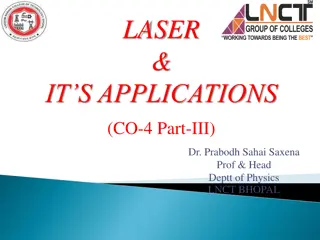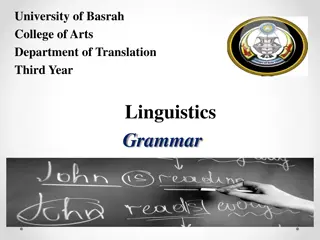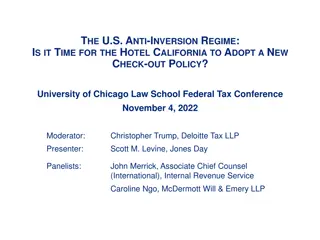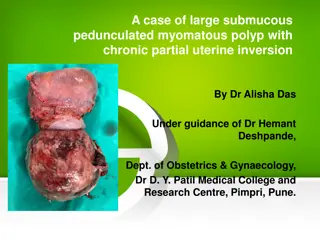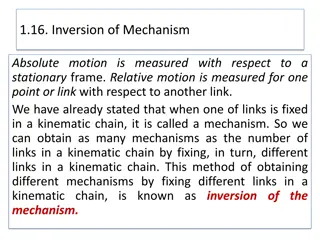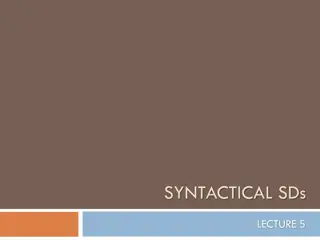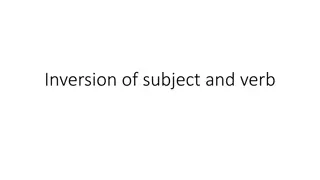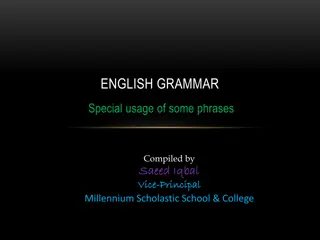Inversion in English Grammar
Inversion is a literary technique where the normal word order is reversed for emphasis or special effect. Learn when to use inversion in English, including guidelines, examples, and cases where it is commonly applied. Explore how to structure sentences with inversion and grasp its significance in formal and everyday English usage.
Download Presentation

Please find below an Image/Link to download the presentation.
The content on the website is provided AS IS for your information and personal use only. It may not be sold, licensed, or shared on other websites without obtaining consent from the author.If you encounter any issues during the download, it is possible that the publisher has removed the file from their server.
You are allowed to download the files provided on this website for personal or commercial use, subject to the condition that they are used lawfully. All files are the property of their respective owners.
The content on the website is provided AS IS for your information and personal use only. It may not be sold, licensed, or shared on other websites without obtaining consent from the author.
E N D
Presentation Transcript
Inversion basically means putting the verb before the subject. It is a literary technique in which the normal order of words is reversed, generally for emphasis or special effect. It makes a sentence sound striking or unusual. It also sounds quite formal. Sentences with inversion are less common in ordinary English. In a sentence with no special effect or emphasis, the normal order of words is retained. Example 1 : I have never seen Example 2 : Never have I seen In example 2, inversion is used to emphasise the fact that in your whole lifetime you have not seen such a beautiful rose. I have never seen such a beautiful rose. Never have I seen such a beautiful rose.
It is sometimes difficult to remember when inversion is or can be used. Here are some guidelines and examples to help you. In normal everyday English, inversion is used : To make questions After 'so' 'neither', 'nor' : nor do I. To make questions : Does he? After 'so' 'neither', 'nor' : So do I, neither do I, Can you?
In written English, as well as in a very formal style, inversion can be used in the following cases : 1 After negative adverbial expressions. 2 After adverbial expressions of place. 3 After 'seldom', 'rarely', 'never', and 'little . 4 After 'hardly', 'scarcely', 'no sooner', when one thing happens after another. 5 After adverbial expressions beginning with 'only' and 'not only' . 6 After so and such at the beginning of a sentence. 7 Conditionals with inversions. 8 After exclamations with 'here' and 'there . 1 After negative adverbial expressions. 2 After adverbial expressions of place. 3 After 'seldom', 'rarely', 'never', and 'little . 4 After 'hardly', 'scarcely', 'no sooner', when one thing happens after another. 5 After adverbial expressions beginning with 'only' and 'not only' . 6 After so and such at the beginning of a sentence. 7 Conditionals with inversions. 8 After exclamations with 'here' and 'there .
1 1 After negative adverbial expressions Under no circumstances In no way At no time Not until race. After negative adverbial expressions : : Under no circumstances can we accept credit cards. In no way can he be held responsible. At no time did she say she would come. Not until I heard my name did I believe I had won the 2 2 After adverbial expressions of place : Round the corner On the doorstep After adverbial expressions of place : Round the corner came the postman. On the doorstep was a bunch of flowers. 3 3 After 'seldom', 'rarely', 'never', and 'little' : Seldom Rarely Never Little After 'seldom', 'rarely', 'never', and 'little' : Seldom have I seen such a beautiful view. Rarely did he pay anyone a compliment. Never had I felt so happy. Little did he imagine how dangerous it would be.
4 4 After 'hardly', 'scarcely', 'no sooner', when one thing happens after another. Hardly interrupted. Scarcely rang. No sooner argue. After 'hardly', 'scarcely', 'no sooner', when one thing happens after another. Hardly had I begun to speak when I was Scarcely had we started our meal when the phone No sooner had I arrived than than they all started to 5 5 After adverbial expressions beginning with 'only' and 'not only' : Only importance of the subject. Only down. After adverbial expressions beginning with 'only' and 'not only' : Only after the meeting did I realize the Only when the plane landed safely did he calm
6 6 After So and Such placed at the beginning of a sentence: So their house. So him. Such After So and Such placed at the beginning of a sentence: So desperate was their situation that they decided to sell So quickly did he run that the others couldn't catch up with Such was the wind that we couldn't open the window. 7 7 Conditionals with inversions: In conditional sentences we can sometimes replace the 'if' with an inversion: Had I known it would be so difficult, I would never have enrolled. Conditionals with inversions: 8 8 After exclamations with 'here' and 'there' : Here comes the winner! There goes all our money! After exclamations with 'here' and 'there' :
1) John had never been to such a fantastic restaurant. Never had John been to such a fantastic restaurant. 2) I in no way want to be associated with this project. In no way do I want to be associated with this project. Never had John been to such a fantastic restaurant. In no way do I want to be associated with this project. 3) They had no sooner eaten dinner than the ceiling crashed onto the dining table. No sooner had they eaten dinner than the ceiling crashed onto the dining table. 4) I had scarcely finished writing my essay when the examiner announced the end of the exam. Scarcely had I finished writing my essay when the examiner announced the end of the exam. 5) I seldom leave my house so early. Seldom do I leave my house so early. No sooner had they eaten dinner than the ceiling crashed onto the dining table. Scarcely had I finished writing my essay when the examiner announced the end of the exam. Seldom do I leave my house so early.
6) People rarely appreciate this musicians talent. Rarely do people appreciate this musician s talent. 7) We would understand what had happened that night only later. Only later would we understand what had happened that night. 8) They had met such rude people nowhere before. Nowhere had they met such rude people before. 9) He understood little about the situation. Little did he understand about the situation. 10) The children should on no account go on their own. On no account should the children go on their own. Rarely do people appreciate this musician s talent. Only later would we understand what had happened that night. Nowhere had they met such rude people before. Little did he understand about the situation. On no account should the children go on their own.

 undefined
undefined





